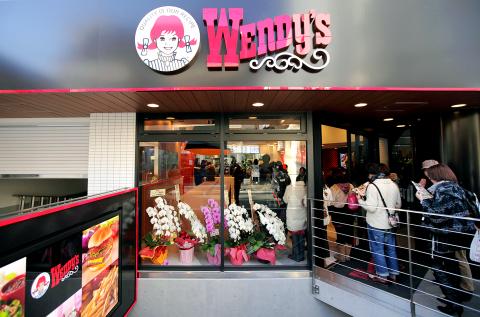Wendy’s Co, the third-biggest US fast-food chain, added goose-liver pate and truffles to burgers as it invests as much as US$200 million on a return to Japan two years after leaving the country.
The Japan Premium sandwich sells for ¥1,280 (US$16) at Wendy’s in Tokyo’s Omotesando luxury shopping area, the first of a targeted 100 shops. “We think the fast-food market here is ready for something different,” Ernest Higa, chief executive officer of Wendy’s Japan LLC, said in an interview at the restaurant’s opening on Tuesday.
Wendy’s is re-entering Japan under a plan to expand outside the US, where it got 92 percent of revenue last year, after posting losses in six of the past eight quarters. The Dublin, Ohio-based chain is focusing on the world’s second-biggest fast-food market first as it looks for operating partners in China and Brazil.

Photo: Bloomberg
“Japan is the most important of the three to me, because we are actually selling burgers here today,” Darrell van Ligten, international division president, said in an interview in Omotesando.
The company expects to eventually expand to about 700 restaurants in Japan, compared with about 3,300 for McDonald’s Corp’s local unit, the nation’s biggest fast-food burger chain.
Wendy’s ended a 30-year run in Japan in 2009 after its partner Zensho Holdings Co declined to renew the agreement, saying it would focus on building its main Sukiya chain of beef-bowl restaurants.
“Our partner had a pretty significant business which was their primary focus,” van Ligten said. “Given the size of the different businesses, Wendy’s wasn’t as much of a focus area as we would have liked it to be.”
In coming back to Japan, the burger chain is counting on its premium menu to lure customers in a “very, very competitive” environment, Higa said.
Wendy’s menu pits it against Japanese rivals, including Mos Food Services Inc’s Mos Burger in terms of taste and Lotteria Co, which has a ¥1,800 Matsuzaka beef burger, for premium items.
However, Japan’s outlook for slow economic growth adds to the pressure on Wendy’s to find a new niche in the industry.
The Bank of Japan last week said the economy’s rebound from the March 11 earthquake has come to a pause, lowering its evaluation for a second straight month because of the local currency’s strength and a cooler global expansion.
McDonald’s Holdings Co Japan forecasts sales of ¥304.5 billion this year, a third straight annual decline and 25 percent less than 2008 revenue.
“With the economic situation, you need to bring something that is unique and exciting,” Higa said.
The “new fashion” of high-end fast food will give the chain what it needs to thrive, he said.

Three experts in the high technology industry have said that US President Donald Trump’s pledge to impose higher tariffs on Taiwanese semiconductors is part of an effort to force Taiwan Semiconductor Manufacturing Co (TSMC, 台積電) to the negotiating table. In a speech to Republicans on Jan. 27, Trump said he intends to impose tariffs on Taiwan to bring chip production to the US. “The incentive is going to be they’re not going to want to pay a 25, 50 or even a 100 percent tax,” he said. Darson Chiu (邱達生), an economics professor at Taichung-based Tunghai University and director-general of

Hon Hai Precision Industry Co (鴻海精密) is reportedly making another pass at Nissan Motor Co, as the Japanese automaker's tie-up with Honda Motor Co falls apart. Nissan shares rose as much as 6 percent after Taiwan’s Central News Agency reported that Hon Hai chairman Young Liu (劉揚偉) instructed former Nissan executive Jun Seki to connect with French carmaker Renault SA, which holds about 36 percent of Nissan’s stock. Hon Hai, the Taiwanese iPhone-maker also known as Foxconn Technology Group (富士康科技集團), was exploring an investment or buyout of Nissan last year, but backed off in December after the Japanese carmaker penned a deal

SUPPORT: The government said it would help firms deal with supply disruptions, after Trump signed orders imposing tariffs of 25 percent on imports from Canada and Mexico The government pledged to help companies with operations in Mexico, such as iPhone assembler Hon Hai Precision Industry Co (鴻海精密), also known as Foxconn Technology Group (富士康科技集團), shift production lines and investment if needed to deal with higher US tariffs. The Ministry of Economic Affairs yesterday announced measures to help local firms cope with the US tariff increases on Canada, Mexico, China and other potential areas. The ministry said that it would establish an investment and trade service center in the US to help Taiwanese firms assess the investment environment in different US states, plan supply chain relocation strategies and

WASHINGTON POLICY: Tariffs of 10 percent or more and other new costs are tipped to hit shipments of small parcels, cutting export growth by 1.3 percentage points The decision by US President Donald Trump to ban Chinese companies from using a US tariff loophole would hit tens of billions of dollars of trade and reduce China’s economic growth this year, according to new estimates by economists at Nomura Holdings Inc. According to Nomura’s estimates, last year companies such as Shein (希音) and PDD Holdings Inc’s (拼多多控股) Temu shipped US$46 billion of small parcels to the US to take advantage of the rule that allows items with a declared value under US$800 to enter the US tariff-free. Tariffs of 10 percent or more and other new costs would slash such